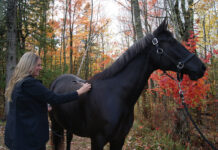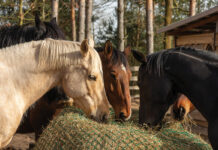With spring here and temperatures on the rise throughout the country, growing mosquito populations increase the risk for deadly mosquito-borne diseases, including West Nile virus and equine encephalomyelitis (Sleeping Sickness). To protect their horses from these diseases, owners are encouraged to vaccinate as part of a comprehensive prevention program.
“Because it isn’t headline news anymore and because it’s been around for several years, many horse owners believe West Nile virus is no longer a threat to their horses,” says Tom Lenz, DVM, vice president of Professional Services at Fort Dodge Animal Health. “This is not true. More than 1,000 horses were diagnosed with the disease last year, with some states reporting more than 50 cases. It is still a serious equine health issue and all horses should be vaccinated.”
Guidelines from the American Association of Equine Practitioners (AAEP) state proper vaccination of previously non-vaccinated horses involves administration of two doses of vaccine three to six weeks apart. Revaccination is best completed in the spring, prior to the onset of mosquito season; however, veterinarians in some areas of the country recommend boostering more than once a year based on the geographic risk. Horse owners should contact their veterinarian as soon as possible to evaluate threat levels in their area and determine their horse’s current vaccination status, to ensure they will have maximum protection against the disease.






Thank you for the update! You are right to point out that this desease no longer has headline status, and one does tend to forget…
Thanks forst had great information. I just had my horse vaccinated and was not aware that she would need a follow up after the first dose.